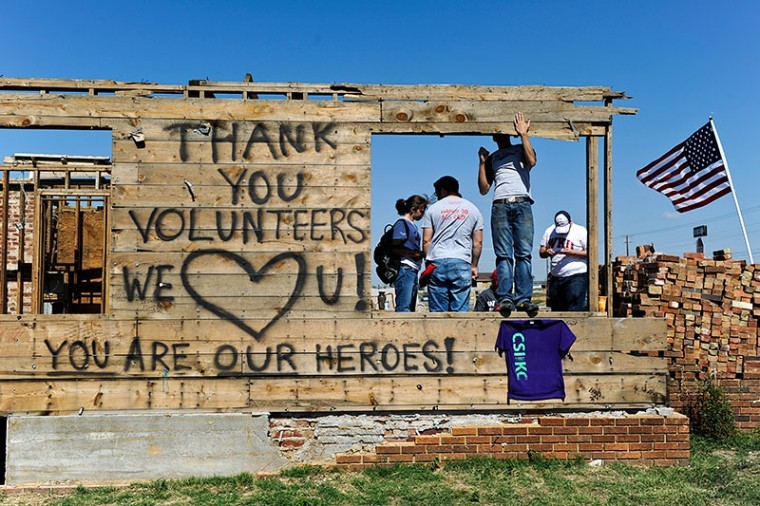WKU instructor, 13 students make return trip to Joplin
October 11, 2011
JOPLIN, Mo. — In the middle of the dead zone sits a house. It has no roof, the windows have no glass, and most of its walls are no longer standing.
On the side of this house is message — “Thank you volunteers. We (heart) you. You are our heroes!”
Next to that message is a WKU Red Towel, signed and nailed to the wall by 13 WKU students and one instructor.
These 14 members of the WKU community spent their fall break in Joplin, Mo., helping with relief efforts of the May 22 tornado that destroyed much of the town. The tornado, categorized an EF-5, the strongest ranking for a tornado, tore through the city killing 162 people and causing more than $2 billion worth of damage.
David Serafini, a history instructor at WKU and adviser of Phi Sigma Pi National Honor Fraternity, first came to Joplin in June, just one month after the tornado hit, with seven members of PSP. Based on the success of the first trip, Serafini decided to plan a return trip during WKU’s fall break. This time, 11 members of PSP and two other WKU students signed up.
“If I could spend all next week here, I would,” Serafini said. “I sort of adopted this project and made it my own. And since I advise these great students, here’s a perfect opportunity to bring them with me.”
When the group reported Friday morning to the base camp for Relief Spark, a nonprofit organization assisting with relief efforts in Joplin, many were taken aback by what they saw.
La Grange freshman DJ McDonald said he was in “utter shock” when he saw the destruction.
“You can see it, but you can’t really experience it until you get there and have a 360 view — and not from the camera lens,” McDonald said.
Base camp, located at the corner of South Main Street and West 26th Street, is surrounded by empty lots where homes once stood, broken trees and piles of rubble. Across the street is what used to be a Taco Bell, and in the distance is the former St. John’s Hospital.
Ben Tarpley, director of operations for Relief Spark in Joplin, said 5,000 homes and 500 businesses were damaged by the tornado. In the four months since, 80,000 volunteers have been to Joplin, 5,000 of which came through Relief Spark.
“The scope of the problems and of the needs is so large, it’s enormous,” Tarpley said. “It’s all about everybody holding hands and doing what little part we can do.”
Relief Spark has committed to stay in Joplin for two more years and rebuild 50 homes, if not more, Tarpley said.
Before many of those homes can be rebuilt, existing damaged properties must be removed or stripped down to the foundation, tasks the WKU group found themselves doing much of Friday and Saturday.
After organizing donations and loading boxes for shipment at a mission on the outskirts of town, Serafini and the students helped remove piles of debris from a roof replacement project on South Pearl Avenue Friday afternoon. Because the city of Joplin is only offering free debris removal until Saturday, moving rubble curbside is currently a top priority for relief organizations.
Saturday was time for the heavy lifting. First the crew gutted and stripped — inside and out — an entire house on Montana Place, which included removing siding, insulation and even the kitchen sink. After lunch, half of the group went to another site a few blocks away to remove a floor with the goal of leaving only the foundation.
Bowling Green senior Anna Bewley went on the first trip to Joplin and helped with debris removal then, but this time, she said she feels like she accomplished more.
“The first time, it honestly felt like I didn’t do hardly anything,” Bewley said. “Like, I was out there in the sun each day and every day helping, but it didn’t feel like I made that much of an impact.”
While Bewley felt like she needed to return to Joplin to do her part, McDonald said he has family connections to the area.
McDonald’s mother’s cousin met his wife in Joplin before they married and moved to Texas. They later returned to Joplin six weeks after the storm to help with clean up efforts.
“When I found out they were going, I had to do it,” McDonald said of Phi Sigma Pi’s trip to Joplin.
While in Missouri, McDonald frequently sent pictures to his family and updated them on projects.
“They can totally tell that it’s changed,” he said. “They’re still just in shock of what happened because you never think where you live will get hit, until it gets hit.”
Before the first day of work had come to an end, Serafini and the students were already tossing around the idea of a Joplin Run III. By the end of the second day, spring break had been decided as the likely date of the next trip.
“There will be a Joplin run for as long as Joplin needs us to run,” Serafini said.
Bewley agreed and said she is ready to return to Joplin.
“There’s so much left to be done that you’re not going to be able to do it all in one day,” Bewley said. “I feel like I’ve accomplished what I came to do. I feel like I’ve done all that I can, and now it’s just time to wait for the next trip.”
Looking back on the trip, Serafini said he saw his students grow, and that he is proud of them for giving up their break to help people in need.
“I would hope that, if God forbid, something, like an EF-5 tornado ever happened in Bowling Green,” Serafini said, his voice breaking, “that a teacher at Missouri Southern or Ozark Christian would come say, ‘We’ve got to come help Bowling Green.’”













